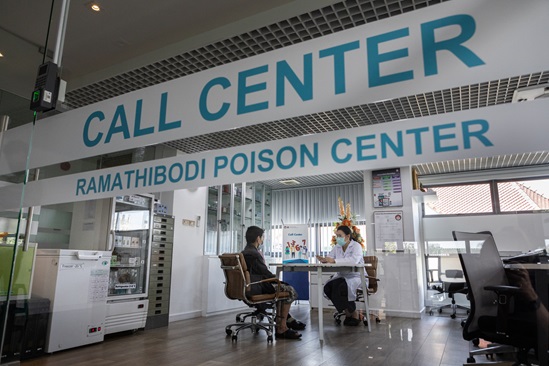Poisons centres
Publications

Guidelines for establishing a poison centre


Toxicovigilance
FAQs on poisons centres
What is a poisons centre?
A poisons centre is a specialized unit that advises on, and assists with, the prevention, diagnosis and management of poisoning. The structure and function of poisons centres varies around the world, however, at a minimum a poisons centre is an information service. Some poisons centres may also include a toxicology laboratory and/or a clinical treatment unit.
What are the chemical safety and public health roles of poisons centres?
Poisons centres are uniquely centralized repositories of data about human exposures to chemicals, including information about the agents involved, the circumstances giving rise to exposure, and the health effects of exposure. These data can be used to help reduce the incidence of poisoning by identifying emerging toxicological hazards (a process known as toxicovigilance), stimulating preventive measures by manufacturers and regulators and assessing the efficacy of such measures. Poisons centre data also contribute to improving knowledge about the human health effects of chemicals.
The centralized nature of poisons centres means that they can be sentinels for chemical release and can provide early warning of disease outbreaks caused by chemicals. Poisons centres contribute to a number of the core capacities needed by countries for implementation of the International Health Regulations (2005), in particular capacities for surveillance, preparedness and response for public health events involving chemical agents.
What does a poisons centre do?
A poisons centre answers enquiries about exposure to chemical agents, including products, pharmaceuticals, natural toxins, pesticides and industrial chemicals. It provides an assessment of whether a particular exposure is hazardous, and information on the need for treatment and the kind of treatment that should be given. Poisons centres aim to promote the evidence-based, cost-effective management of poisoning and to ensure that unnecessary or ineffective treatment is avoided.
Poisons centres offer a service to health professionals and also, in many countries, to the general public. Other users include the emergency services, government bodies, regulatory agencies and education services.
Poisons centres also maintain databases, including toxicological databases, databases of product formulations and databases of poisoning enquiries to the centre.
Many poisons centres participate in chemical incident preparedness and response activities at local and national level.
How does WHO assist Member States to establish poisons centres?
WHO has developed guidance and training materials on poisons centres and poisons centre operations and periodically organizes training workshops. WHO can also facilitate the provision of training placements at well-established poisons centres and, through its poisons centre network, it fosters links between new and well-established poisons centres.
WHO has developed tools to facilitate the collection of internationally harmonized data on poisoning. This comprises a multilingual controlled terminology and classifications.
WHO has recently carried out a feasibility study on the establishment of a sub-regional poisons centre in the East Africa sub-region. This project was funded through the Strategic Approach to International Chemicals Management (SAICM) Quick Start Programme.

